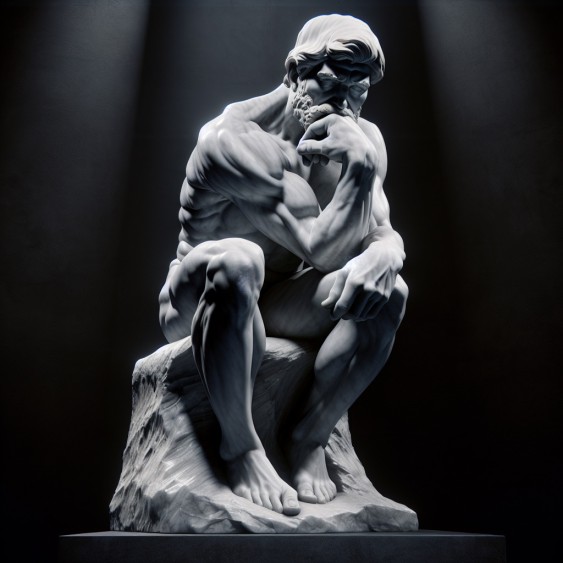
Embracing Diversity: The Observer vs. The Participator
Nov 2, 2025
The Observer and the Fire
Every culture believes its crisis is unique. It never is. History changes the costumes. In today’s Europe, a new polarity emerges—the Observer and the Participator. One steps back to see the field; the other charges in to change it. Both serve a function. Both can destroy if misapplied.
The Participator is driven by belonging. When identity feels threatened, instinct takes over. The voice rises—the pulse quickens. Testosterone commands action, often before comprehension. Nations are built on this energy—but so are riots. The Observer, by contrast, watches emotion without drowning in it. He studies patterns the way a trader studies charts: price swings as psychology, migration as momentum, rhetoric as volatility. Detachment isn’t cowardice; it’s calibration.
Confucius said the superior man acts before he speaks; Socrates warned that an unexamined life isn’t worth living. Both knew that discipline of perception is rarer than courage in battle. The Observer’s advantage lies in the delay between impulse and response. That microsecond of analysis decides whether civilisation evolves or repeats itself.
Patriotism, when untethered from intellect, mutates into superstition. Samuel Johnson’s old warning—“patriotism is the last refuge of the scoundrel”—was not cynicism; it was a diagnosis. The manipulator always sells belongings at a premium. Every demagogue in history has weaponised the need to belong. The Observer recognises the pattern early: collective fear as political currency.
To observe correctly is not to stand neutral; it’s to know when movement serves no function but noise. The Observer calculates risk-to-reward ratios not in terms of profit but of cultural stability. If resistance guarantees destruction, the wise withdraw. If silence guarantees rot, the wise engage. Each act—fight or flee—is a transaction with consequence.
This is where modern Europe finds itself: torn between pride and pragmatism. Borders blur, demographics shift, and language itself becomes a battlefield. The Observer must decide when adaptation preserves identity and when concession erases it. The answer is never ideological; it’s mathematical—what keeps the structure intact?
Balance is the art. Detachment without empathy becomes nihilism; empathy without detachment becomes hysteria. Aristotle captured it in one sentence: composure amid misfortune is virtue. Emotional regulation is a national strategy.
Ignorance, not diversity, is the true contagion. Education—not in degrees, but in critical literacy—is the vaccine. A society that can’t interpret its own tension is doomed to reenact it.
The Observer, therefore, is not passive. He is surgical. He measures each act by consequence, not emotion. He learns from history that when mobs burn libraries, civilisations follow. And he knows that in times of confusion, clarity is an act of defiance.
Fight, Flee, or Transcend
Sometimes, observation isn’t enough. When structures decay, participation becomes survival. The question then shifts from ‘should I act?’ to ‘how violently must I act to restore equilibrium?’ History has no mercy for half-measures.
To fight properly is to remove hesitation. Conflict, once chosen, demands total commitment—psychological, strategic, and ethical. A nation that fights halfway breeds endless insurgency. But the Observer understands that fighting the wrong enemy guarantees extinction. Power rarely wears the uniform you expect. The true manipulator incites the masses against each other while tightening control unseen. Every empire’s collapse begins with internal distraction engineered by those already in command.
Education is the only lasting defence. Ignorance—religious, economic, cultural—is the common denominator of every implosion. Extremists are not born; they are manufactured through deprivation. The uneducated become fuel. The educated, if cowardly, become accomplices. The Observer’s role is to identify ignorance as the vector, not ethnicity or faith. Religion is not the virus—illiteracy is.
When systems reward dependence, corruption becomes habit. Compassion without boundaries devolves into chaos. Generosity must come with accountability, or it curdles into resentment. Societies that feed without expectation of contribution hollow themselves. When the host forgets, it can say no, it dies of politeness.
The principle is simple: balance contribution and belonging. Inclusion does not mean surrender. Diversity without coherence is entropy. Rules are not oppression; they are architecture. The house welcomes guests but dictates its own order. Those who refuse the order choose the exit, not exile.
Punishment in a just society must be swift, not cruel. It exists not to avenge but to deter. When consequence disappears, crime becomes culture. The Observer endorses decisive law not from vengeance but necessity. Civilization survives on consistency, not emotion.
Above all, the Observer avoids religious war. Nothing corrodes intellect faster than divine justification. When faith replaces thought, negotiation dies—the wise separate belief from governance as lungs from fire—necessary apart, lethal combined.
Adaptation is the final truth. Change is the only constant in history, and resistance to inevitability is suicide dressed as valour. The Observer’s victory lies not in conquest but in endurance—outlasting the hysteria of both the participator and the demagogue.
To observe is not to hide. It is to stand still long enough to see the entire field, to act when action aligns with outcome, and to walk away when victory would taste like corruption.
That is not neutrality.
That is mastery.
Conclusion — The Final Art of Observation
Jonathan Swift once said that when true genius appears, the dunces form a confederacy against him.
Suvorov would have smiled at that—then advanced through the confederacy without mercy.
Both men understood the same law: civilisation survives only by clarity of thought and precision of strike. Swift used satire like a scalpel, exposing hypocrisy so completely that his enemies mistook it for humour. Suvorov used simplicity like a weapon—speed, surprise, audacity—war reduced to pure geometry. Each mastered the same craft: destruction in the service of renewal.
If Swift commanded armies, he’d wage irony as artillery; if Suvorov wrote essays, every sentence would bleed. Together they teach the same creed—think without illusion, act without hesitation.
In a world of noise and sentimentality, the Observer must become both surgeon and soldier: dissect lies, then burn the infection. Detach enough to see the truth, ruthless enough to defend it.
Swift mocked the delusions that rot empires from within. Suvorov annihilated the forces that threatened them from without. Their synthesis is final wisdom: see through everything, strike at what matters, never waste a bullet or a word.
Because history doesn’t forgive confusion. It rewards only two kinds of people—
those who understand the battlefield,
and those who own it.
Other Articles of Interest










